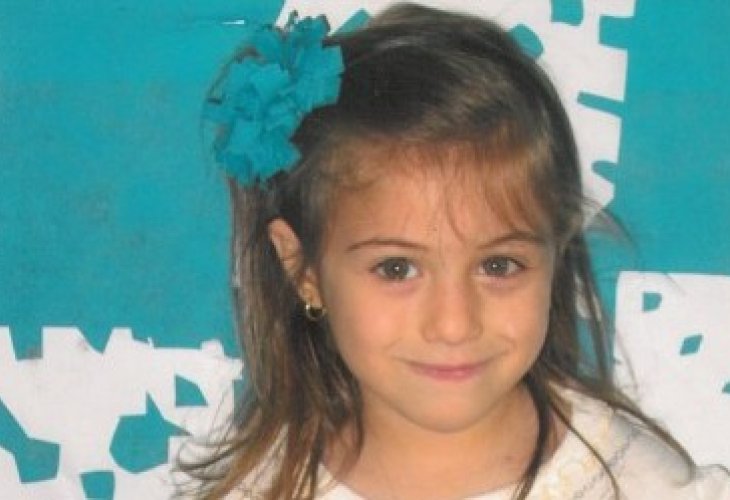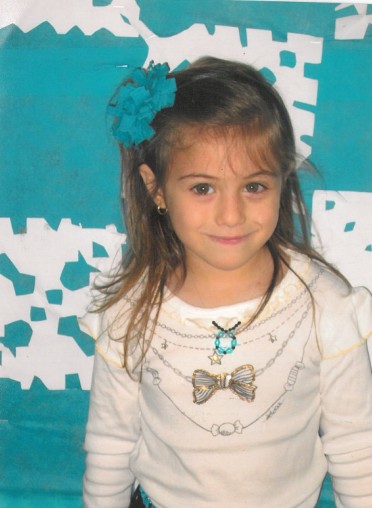The Mother of the Epileptic Girl: "Hashem is Proud of Us for Facing These Challenges"
What is life like for an eleven-and-a-half-year-old girl with epilepsy? How do those around her react, how do her friends cope, and what provides comfort during tough times? Leah Cohen, mother of the sweet Simma, shares her heartfelt story.
 Simma Cohen in her childhood
Simma Cohen in her childhood"It was a most fateful moment," recounts teacher Deborah, "I left the children for just a moment in the yard and went inside to fetch scissors. As I opened the drawer, I heard a faint voice from afar: 'Goldy, Goldy, come down!' I looked out the window and... I let out a stifled scream. At that moment, I saw Goldy, the mischievous girl, atop the fence railing separating us from the neighbors. (Their yard is more than a story below us.) Goldy's knees clung to the railing's edge as her small body bent downward.
The assistant froze in place, and I ran out in sheer panic. I grabbed the little one with trembling hands and set her on the ground with a dreadful scream: 'That's dangerous!!' I held the girl tightly, clutching her hand as terrifying thoughts swirled in my mind about what could have happened. I sat on a chair, holding firmly onto the mischievous hand, wondering how I could have left the children alone, even for a moment. I couldn't forgive myself.
That afternoon, when Goldy's mother came and reached out for her, I told her, pale: 'Thank Hashem you have your daughter to take home today.' The mother smiled and asked, 'What did she do today?' I told her.
'We don’t let Goldy out to the balcony at home either, right, Goldy?' she said to the little one in her arms. 'We let Feigy, her younger sister, play on the balcony, but Goldy isn’t allowed – it’s very dangerous!' She added, 'How she climbs... it’s truly a risk to life!'
The next day, when Goldy arrived at the daycare, her mother handed me a box of exquisite chocolate adorned with ribbons, smiling, 'This is for you, to recover from yesterday'...
Life with Epilepsy
This serious account is told by author Deborah Neugerschal in her book 'Small Secrets'. The girl 'Goldy' described in the story is completely real. Her name is Simma Cohen, and she is now almost eleven and a half years old.
It wasn’t just coincidence that she exhibited behaviors like climbing and taking risks. They come from her epilepsy, diagnosed since she was three months old.
"Until then, she was a completely normal baby," her mother, Leah, shares. "But at three months old, we woke up one morning to find Simma having a seizure. We immediately called an ambulance that took her to the hospital, where they quickly diagnosed epilepsy, after ruling out other causes. Initially, the neurologists tried to calm us by saying they see about a thousand cases like this a year, but we weren’t calmed. She was our firstborn, and all we remember from that period is stress and hysteria. We were young, inexperienced parents, and we didn’t know what to do."
As Leah notes, they started medication immediately. "Getting Simma to take her medication every day was not easy. She had severe eating problems, and convincing her to swallow it was a nightmare. However, after she took the medication consistently, she stabilized and stopped having seizures."
Although seizures stopped, Leah mentions that the medications Simma took regularly caused other developmental issues, such as language delays and additional challenges.
"Until she was three months old, she was a perfectly normal baby. The day before her first seizure, she was even beginning to turn over, and then suddenly, it all vanished. From a motor perspective, she wasn’t affected at all, rather the opposite—she managed to climb places others couldn’t. But in other aspects, she was delayed, and it was very obvious. At two, she went to a private daycare, but she struggled there, so we placed her in a language-focused program the following year."
When Simma was three and a half, doctors found the medication she was on wasn't suitable for her. "It turns out the medication was causing her delays and issues," says Leah. "At times, even a small bump would make her cry and immediately trigger a seizure, which was very concerning. I recall once going with her to a store and someone accidentally bumped her lightly, and she began seizing. Everyone panicked, but our neighbor, who knew about Simma's condition, reassured them. Because of him, we didn’t have to be taken by ambulance."
At age five, when she appeared to have seizures again, her medication was changed once more. "We experienced ups and downs, but at five, thank Hashem, Simma stabilized," says Leah.

The Power of Community
From then until third grade, there was thank Hashem peace. "Simma was in a typical classroom and everything was great," Leah describes. "In a way, we became complacent, feeling the hardest chapter was behind us, over and complete. But at the start of third grade, Simma had a seizure in bed after a very long break without them. We had to resume treatment, and she began taking medication again. This led to strange behaviors in class, and she started falling behind significantly.
"We took her for an EEG, which was very concerning. Though she seemed stable, it turned out she wasn't at all. There were numerous seizures she experienced during sleep that we were completely unaware of."
After various tests and considerations, Simma started a new medication. "This medication prevented seizures, but it caused behavioral issues in class. She developed memory problems, restlessness, confusion," her mother describes sadly.
Is there no medication for epilepsy that doesn't affect functioning?
"Unfortunately, to my knowledge, there isn’t one. Some are less affected, and the impact is nearly invisible, while others, like Simma, experience severe side effects. But no medication exists solely to prevent seizures without causing side effects."
Leah also notes a new issue that developed for Simma, previously unrecognized, which is disconnection spells. "Many epilepsy patients suffer disconnection episodes, leading to falls and potential injuries. As a result of this, she was prescribed another medication causing drowsiness and other frustrating side effects."
Currently, Leah notes that Simma is a wonderful, sweet eleven-and-a-half-year-old studying in a small class in a regular school. "She loves learning and adores her friends. From the outside, you’d never guess what she goes through—she seems completely ordinary. But she continues her medication and bravely faces complex situations."
And how does the environment respond?
"Over the years," Leah says, "there have been times when we encountered understanding staff, but others didn’t know how to react or respond to the child. I want to convey several important messages to teachers with such children in class: Don't punish them; they never intend to act out. These are side effects of the medications. On the other hand, don’t panic during seizures. Ask the parents to instruct you on what to do specifically and respond accordingly. I remain eternally grateful to a fellow mother at a daycare Simma attended, who simply explained to her daughter what Simma was going through, and often invited her over to play."
Another source of strength for her is a special group for mothers of observant children with epilepsy. "This is a group of several dozen mothers; we have a support WhatsApp, exchanging a great deal of information, as each one knows epilepsy from a different angle. One mother once consulted us on a topic before discussing it with a neurologist, who was amazed by the knowledge she possessed. We occasionally meet and organize programs or talks, preparing our own refreshments. Additionally, we have a divided Tehillim we read daily and special psalms we say during emergencies, like when a child enters treatment or surgery."
Leah also has a message for parents of children with epilepsy: "Some try, for some reason, to hide the illness. They believe their children are balanced and there’s no reason to live with the stigma of being sick. I too hid it for the first few years but felt limited, as I couldn’t let my child visit friends. I always feared—‘what if something happens?’ It harmed Simma’s social life. I did everything to keep her condition a secret, but when she had a seizure in front of others, it always caused embarrassment. Eventually, I decided to lay all cards on the table. I don’t hide a thing, and when meeting friends, I introduce Simma without any shame: ‘She’s our epileptic.’ I feel no embarrassment; I haven't done anything wrong. For the child, it's comfortable that people are aware of her condition and strive to understand her."
What gives you strength in such a challenging daily life?
"In moments when it seems overwhelming and I’m struck—‘Wow, what a punishment, why me?’ I always bolster myself with the thought that before we came into this world, Hashem showed us all we would encounter. He told me, 'There will be a sweet child needing a loving home to help her through,' and I agreed to be her mother. Simma too, before she was born, heard from Hashem what she would face and gave her consent. Now, it’s our task to face it together, understanding this is our mission in this world. Each time it becomes difficult, I try to hear Hashem saying, 'My daughters, well done, you’re fulfilling your promises to me. I am proud of you.'"

